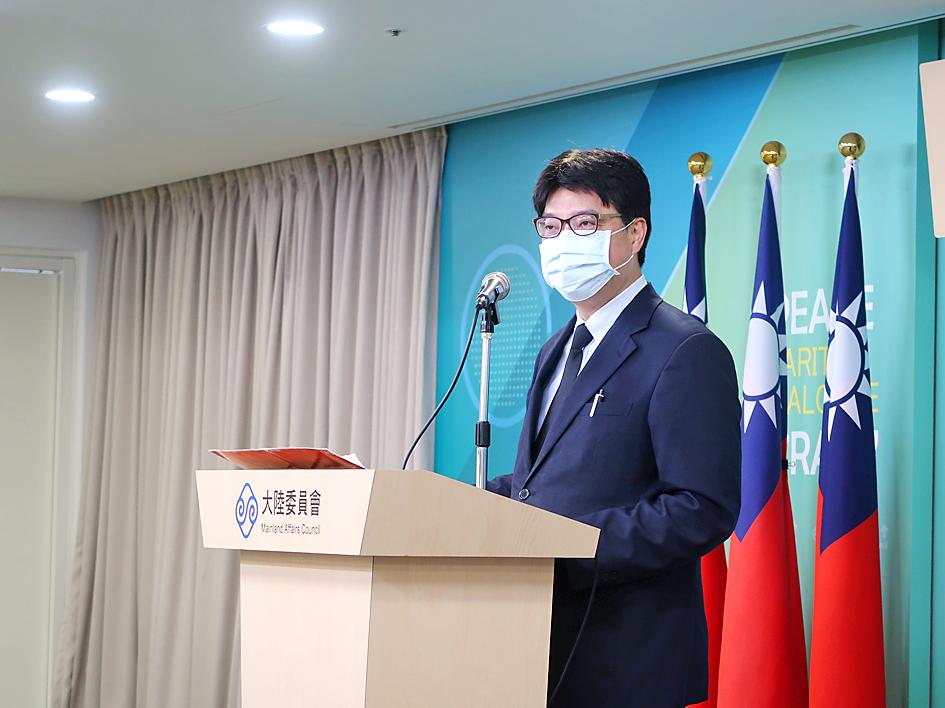China’s understanding of the so-called “1992 consensus” leaves no room for the Republic of China (ROC), Mainland Affairs Council (MAC) spokesman Chiu Chui-cheng (邱垂正) said yesterday, after Beijing criticized comments on the issue by Chinese Nationalist Party (KMT) Chairman Eric Chu (朱立倫).
Chu on Monday told the Brookings Institution in the US — where he is leading a delegation of KMT officials on an 11-day tour — that the party’s “1992 consensus” was a “non-consensus consensus” and an example of “constructive ambiguity.”
“We are mislabeled by some people. Some media say we are a pro-China party. It is totally wrong. We are a pro-US party, forever,” Chu said in a keynote speech at the Washington-based institute.

Photo: CNA
The “1992 consensus” — a term former MAC chairman Su Chi (蘇起) in 2006 admitted making up in 2000 — refers to a tacit understanding between the KMT and the Chinese government that both sides of the Taiwan Strait acknowledge there is “one China,” with each side having its own interpretation of what “China” means.
Asked about the comments yesterday, China’s Taiwan Affairs Office (TAO) spokesman Ma Xiaoguang (馬曉光) told a regular news briefing in Beijing that “willful distortions of the 1992 consensus will not be tolerated.”
“Any political party, group or individual on the island seeking to maintain peace across the Taiwan Strait must ... keep a clear head, stay on the correct path and be on the right side of history,” Xinhua news agency quoted him as saying.
“Taiwan is a part of China. Cross-strait affairs is a family matter for Chinese compatriots on both sides and it should be handled by the family without outside meddling,” he said.
The KMT should “stay on the correct path,” Ma added in a rebuke of Chu’s visit to the US.
Chiu told a news conference in Taipei that Ma “has made plain that the communists see no difference between the 1992 consensus and accepting its one China principle.”
“This formula does not allow any space for the Republic of China to exist. For that reason, it was rejected by the overwhelming majority of Taiwanese,” he said.
Taiwanese know that China uses the “1992 consensus” and the “one China” principle as instruments to further its so-called unification of Taiwan, he said, adding that Taipei firmly opposes any infringement of the nation’s sovereignty.
“We urge Beijing to give up the political framework it seeks to impose on Taiwan, abandon the use of armed threats and acknowledge the reality that the ROC exists,” he said.

INVESTIGATION: The case is the latest instance of a DPP figure being implicated in an espionage network accused of allegedly leaking information to Chinese intelligence Democratic Progressive Party (DPP) member Ho Jen-chieh (何仁傑) was detained and held incommunicado yesterday on suspicion of spying for China during his tenure as assistant to then-minister of foreign affairs Joseph Wu (吳釗燮). The Taipei District Prosecutors’ Office said Ho was implicated during its investigation into alleged spying activities by former Presidential Office consultant Wu Shang-yu (吳尚雨). Prosecutors said there is reason to believe Ho breached the National Security Act (國家安全法) by leaking classified Ministry of Foreign Affairs information to Chinese intelligence. Following interrogation, prosecutors petitioned the Taipei District Court to detain Ho, citing concerns over potential collusion or tampering of evidence. The

‘FORM OF PROTEST’: The German Institute Taipei said it was ‘shocked’ to see Nazi symbolism used in connection with political aims as it condemned the incident Sung Chien-liang (宋建樑), who led efforts to recall Democratic Progressive Party (DPP) Legislator Lee Kun-cheng (李坤城), was released on bail of NT$80,000 yesterday amid an outcry over a Nazi armband he wore to questioning the night before. Sung arrived at the New Taipei City District Prosecutors’ Office for questioning in a recall petition forgery case on Tuesday night wearing a red armband bearing a swastika, carrying a copy of Adolf Hitler’s Mein Kampf and giving a Nazi salute. Sung left the building at 1:15am without the armband and apparently covering the book with a coat. This is a serious international scandal and Chinese

Seventy percent of middle and elementary schools now conduct English classes entirely in English, the Ministry of Education said, as it encourages schools nationwide to adopt this practice Minister of Education (MOE) Cheng Ying-yao (鄭英耀) is scheduled to present a report on the government’s bilingual education policy to the Legislative Yuan’s Education and Culture Committee today. The report would outline strategies aimed at expanding access to education, reducing regional disparities and improving talent cultivation. Implementation of bilingual education policies has varied across local governments, occasionally drawing public criticism. For example, some schools have required teachers of non-English subjects to pass English proficiency

TRADE: The premier pledged safeguards on ‘Made in Taiwan’ labeling, anti-dumping measures and stricter export controls to strengthen its position in trade talks Products labeled “made in Taiwan” must be genuinely made in Taiwan, Premier Cho Jung-tai (卓榮泰) said yesterday, vowing to enforce strict safeguards against “origin laundering” and initiate anti-dumping investigations to prevent China dumping its products in Taiwan. Cho made the remarks in a discussion session with representatives from industries in Kaohsiung. In response to the US government’s recent announcement of “reciprocal” tariffs on its trading partners, President William Lai (賴清德) and Cho last week began a series of consultations with industry leaders nationwide to gather feedback and address concerns. Taiwanese and US officials held a videoconference on Friday evening to discuss the